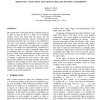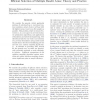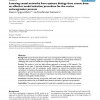24 search results - page 1 / 5 » Indifference-zone subset selection procedures: using sample ... |
WSC
2007
13 years 6 months ago
2007
Two-stage selection procedures have been widely studied and applied in determining the required sample size (i.e., the number of replications or batches) for selecting the best of...
WSC
1998
13 years 5 months ago
1998
We consider how to efficiently allocate computing resources in order to infer the best of a finite set of simulated systems, where best means that the system has the maximal expec...
WSC
2008
13 years 6 months ago
2008
This paper develops procedures for selecting a set of normal populations with unknown means and unknown variances in order that the final subset of selected populations satisfies ...
ICML
2010
IEEE
13 years 5 months ago
2010
IEEE
We consider the general, widely applicable problem of selecting from n real-valued random variables a subset of size m of those with the highest means, based on as few samples as ...
BMCBI
2007
13 years 4 months ago
2007
Background: Causal networks based on the vector autoregressive (VAR) process are a promising statistical tool for modeling regulatory interactions in a cell. However, learning the...



